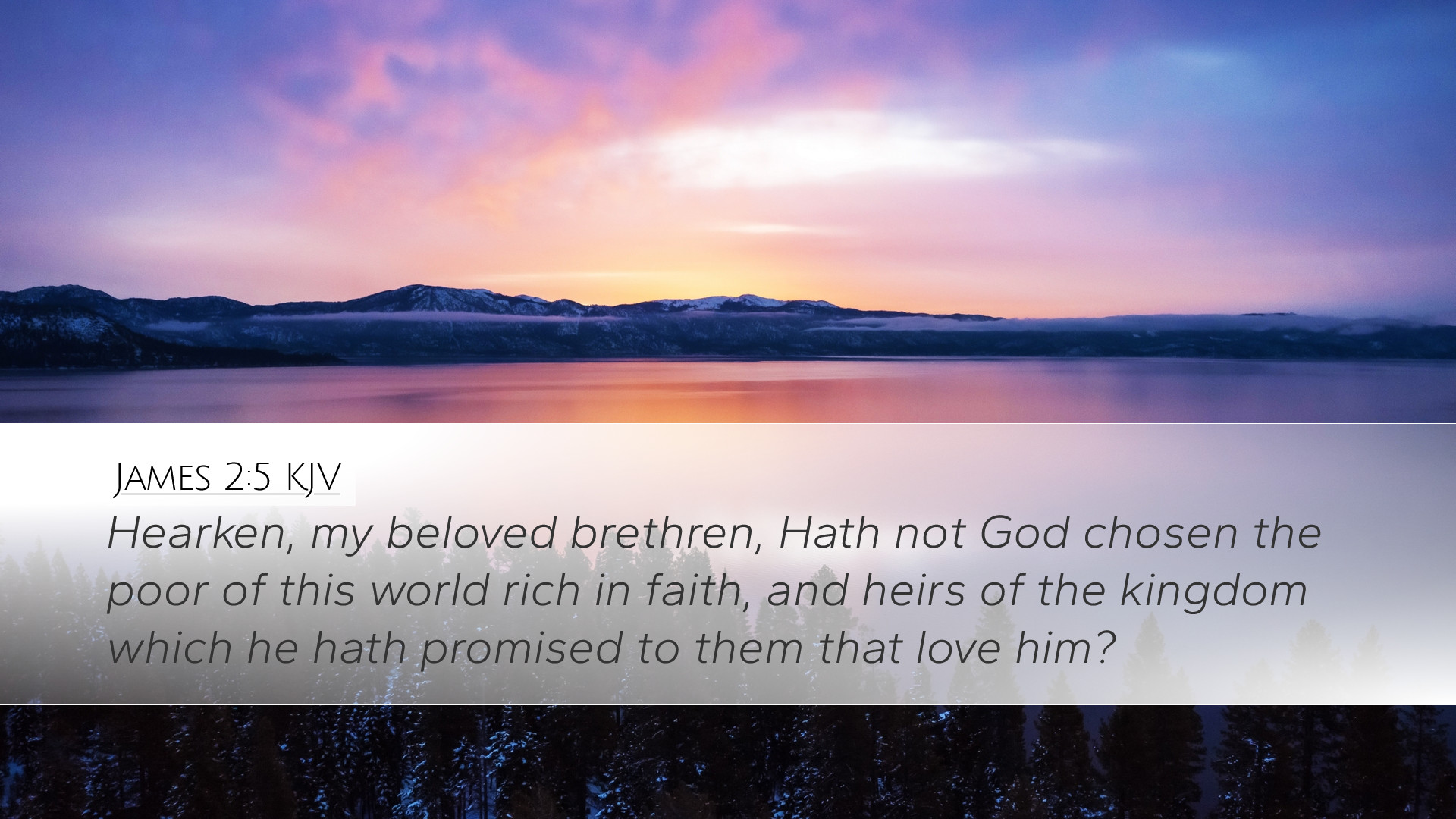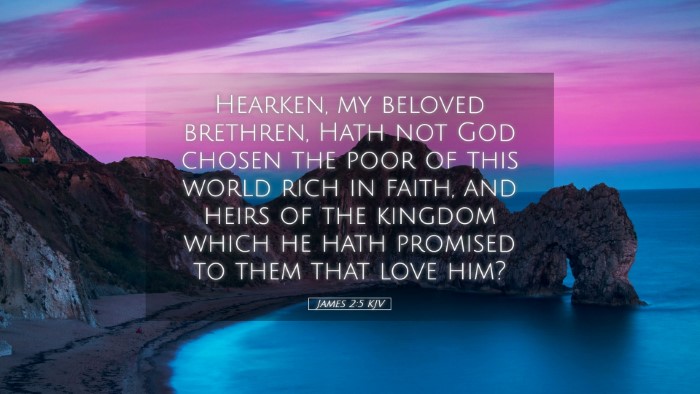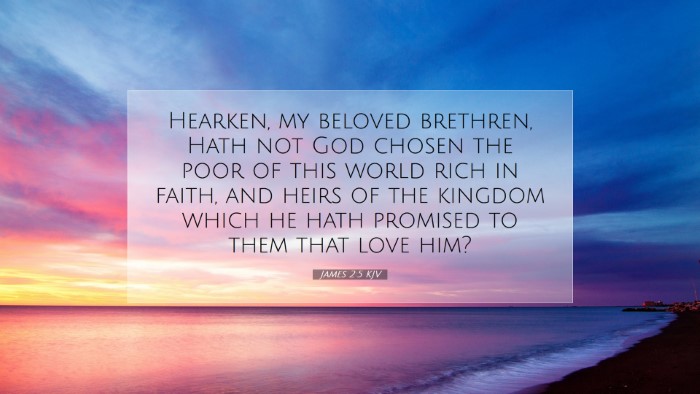Old Testament
Genesis Exodus Leviticus Numbers Deuteronomy Joshua Judges Ruth 1 Samuel 2 Samuel 1 Kings 2 Kings 1 Chronicles 2 Chronicles Ezra Nehemiah Esther Job Psalms Proverbs Ecclesiastes Song of Solomon Isaiah Jeremiah Lamentations Ezekiel Daniel Hosea Joel Amos Obadiah Jonah Micah Nahum Habakkuk Zephaniah Haggai Zechariah MalachiJames 2:5
James 2:5 KJV
Hearken, my beloved brethren, Hath not God chosen the poor of this world rich in faith, and heirs of the kingdom which he hath promised to them that love him?
James 2:5 Bible Commentary
Commentary on James 2:5
James 2:5 states: "Listen, my dear brothers and sisters: Has not God chosen those who are poor in the eyes of the world to be rich in faith and to inherit the kingdom he promised those who love him?" This verse serves as a significant theological assertion within the epistle of James, providing profound insights into God’s preferential treatment of the marginalized.
Introduction
In the epistle of James, the author addresses various issues facing the early Christian community. The context of James 2:5 suggests a rebuke against favoritism, particularly concerning the treatment of the poor versus the rich. Commentators have extensively explored the implications of this verse, focusing on God’s choice, the nature of true riches, and the ethical implications for the Christian community.
Understanding the Context
The immediate context of James 2 involves a warning against discrimination based on economic status. James challenges the believers for showing partiality, reminding them that God’s kingdom often reverses societal norms.
Matthew Henry's Insights
Matthew Henry emphasizes that this passage serves as a reminder not to be deceived by the ephemeral nature of wealth. He asserts that God’s kingdom is inherently egalitarian, where the poor have a special place due to their reliance on faith rather than material wealth.
- Rich in Faith: Henry underscores that the poor are often "rich in faith," suggesting that their humble circumstances foster a deeper reliance on God's provision.
- God's Choosing: He highlights that God's choice of the poor reflects divine wisdom, elevating their social position in the eyes of God.
Albert Barnes' Exegesis
Albert Barnes elaborates on the implications of divine election. He notes that God has chosen the poor as a means of demonstrating His grace and favor. Barnes poignantly states that wealth can often lead to spiritual blindness, while the poor are more attuned to their spiritual neediness.
- Inherit the Kingdom: Barnes conveys that the promise of the kingdom is extended to those who love God, irrespective of their social status, and emphasizes that genuine love for God transcends materialistic measures.
- Riches of Faith: He affirms that the "rich in faith" mindset demonstrates the true riches that believers should seek, which are found in spiritual rather than worldly wealth.
Adam Clarke's Contributions
Adam Clarke adds depth to the discussion by placing emphasis on the characteristics of God's kingdom. He asserts that the kingdom of God is not based on human merit, but solely on God’s grace. Clarke examines the spiritual state of the 'poor' who believe in Christ, underscoring that they hold a special place within the community of believers.
- Divine Favor: Clarke elaborates on the notion of divine favor resting on the poor, emphasizing the transformative power of faith over financial status.
- Invitation to All: He reminds readers that the message of the Gospel is inclusive, and God's call extends to every person, regardless of their earthly affluence.
Theological Implications
The favorite status of the poor in God's eyes speaks to broader theological themes within the New Testament regarding grace, mercy, and the radical nature of the Gospel. This verse invites us to reevaluate our values and attitudes towards wealth in light of God’s kingdom.
- Grace Over Merit: The notion of grace receiving a particular focus implies that all believers, especially the marginalized, encounter God’s love in powerful ways.
- Economic Status vs. Spiritual Authenticity: The unequal treatment of the rich versus the poor within the church reflects broader societal issues and challenges congregations to strive for a true community of faith.
Practical Applications
For pastors and church leaders, the implications of James 2:5 extend beyond mere theological discourse. The call to acknowledge and uplift the "poor in spirit" serves as a mandate for active engagement in social justice and compassion ministries.
- Church Inclusion: Churches should reflect the diversity of God’s kingdom, seeking to include those from all walks of life, especially the economically disadvantaged.
- Faith-Based Outreach: Pastors are encouraged to advocate for those who are marginalized, demonstrating God’s inclusive love through practical outreach initiatives.
Conclusion
In summary, James 2:5 encapsulates a profound truth about God’s upside-down kingdom where the poor are honored for their faith and love for God. This verse serves as a clarion call to believers to transcend societal prejudices, focusing instead on nurturing a community reflective of God’s grace, mercy, and inclusive love.
As we meditate on this scripture, let us remember that our standing before God is not determined by wealth or status but by our faith in Christ and our love for one another.


